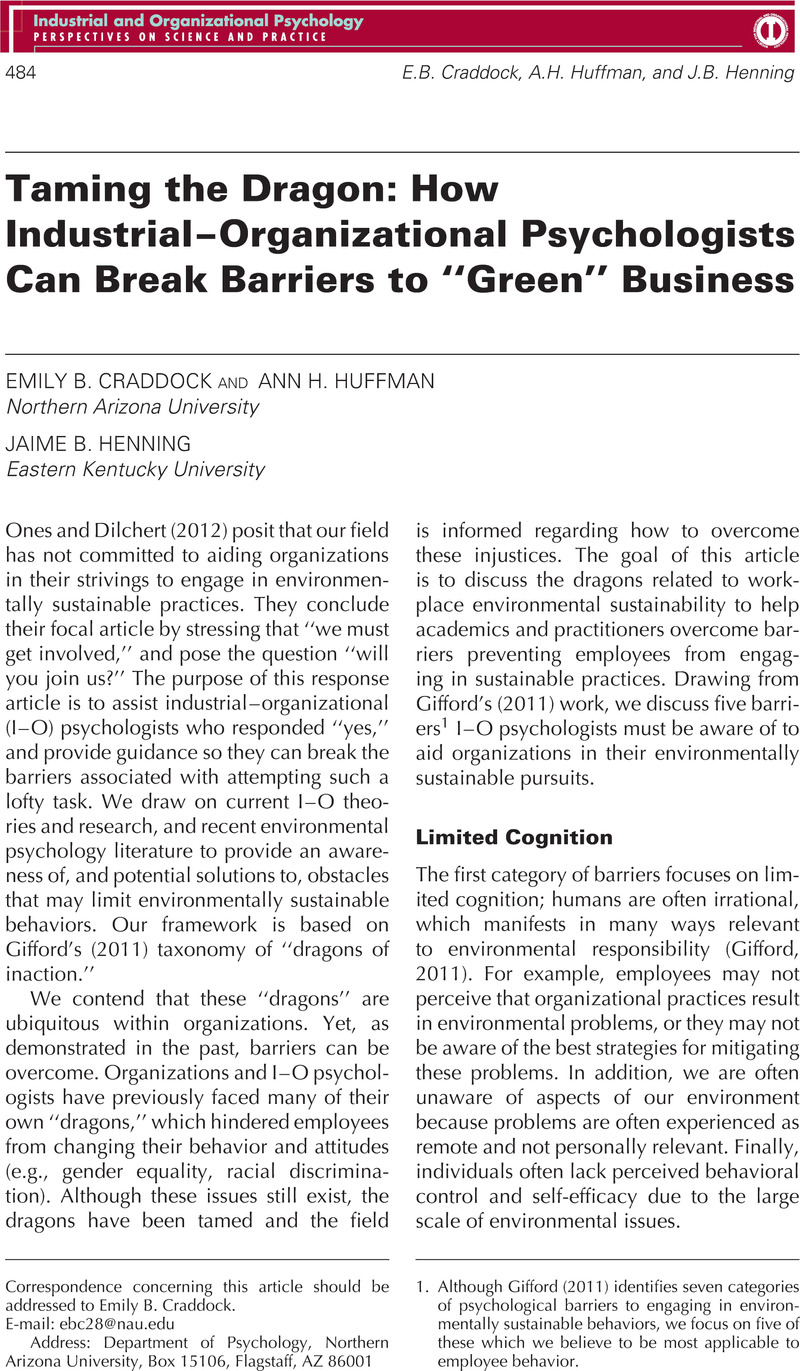Crossref Citations
This article has been cited by the following publications. This list is generated based on data provided by Crossref.
Dilchert, Stephan
and
Ones, Deniz S.
2012.
Environmental Sustainability in and of Organizations.
Industrial and Organizational Psychology,
Vol. 5,
Issue. 4,
p.
503.
Paillé, Pascal
and
Mejía-Morelos, Jorge Humberto
2014.
Antecedents of pro-environmental behaviours at work: The moderating influence of psychological contract breach.
Journal of Environmental Psychology,
Vol. 38,
Issue. ,
p.
124.
Paillé, Pascal
and
Raineri, Nicolas
2015.
Linking perceived corporate environmental policies and employees eco-initiatives: The influence of perceived organizational support and psychological contract breach.
Journal of Business Research,
Vol. 68,
Issue. 11,
p.
2404.
Paillé, Pascal
Mejía-Morelos, Jorge Humberto
Marché-Paillé, Anne
Chen, Chih Chieh
and
Chen, Yang
2016.
Corporate Greening, Exchange Process Among Co-workers, and Ethics of Care: An Empirical Study on the Determinants of Pro-environmental Behaviors at Coworkers-Level.
Journal of Business Ethics,
Vol. 136,
Issue. 3,
p.
655.
Dumitru, Adina
De Gregorio, Eugenio
Bonnes, Mirilia
Bonaiuto, Marino
Carrus, Giuseppe
Garcia-Mira, Ricardo
and
Maricchiolo, Fridanna
2016.
Low carbon energy behaviors in the workplace: A qualitative study in Italy and Spain.
Energy Research & Social Science,
Vol. 13,
Issue. ,
p.
49.
Paillé, Pascal
2020.
Greening the Workplace.
p.
57.
Paillé, Pascal
Valéau, Patrick
and
Renwick, Douglas W.
2020.
Leveraging green human resource practices to achieve environmental sustainability.
Journal of Cleaner Production,
Vol. 260,
Issue. ,
p.
121137.
Francoeur, Virginie
and
Paillé, Pascal
2022.
Green Behaviors in the Workplace.
p.
129.
Amel, Elise L.
Manning, Christie M.
Daus, Catherine S.
and
Quinn, Makayla
2023.
Fostering Sustainability in Higher Education.
p.
135.
Amel, Elise L.
Manning, Christie M.
Daus, Catherine S.
and
Quinn, Makayla
2023.
Fostering Sustainability in Higher Education.
p.
35.
Amel, Elise L.
Manning, Christie M.
Daus, Catherine S.
and
Quinn, Makayla
2023.
Fostering Sustainability in Higher Education.
p.
99.
Amel, Elise L.
Manning, Christie M.
Daus, Catherine S.
and
Quinn, Makayla
2023.
Fostering Sustainability in Higher Education.
p.
77.
Amel, Elise L.
Manning, Christie M.
Daus, Catherine S.
and
Quinn, Makayla
2023.
Fostering Sustainability in Higher Education.
p.
15.
Paillé, Pascal
Sanchez-Famoso, Valeriano
Valéau, Patrick
Ren, Shuang
and
Mejia-Morelos, Jorge Humberto
2023.
Green HRM through social exchange revisited: when negotiated exchanges shape cooperation.
The International Journal of Human Resource Management,
Vol. 34,
Issue. 17,
p.
3277.





